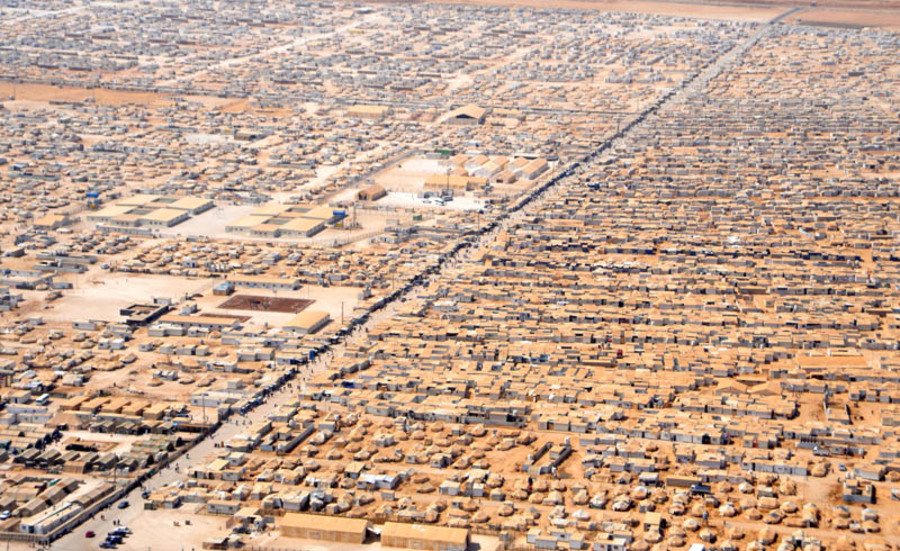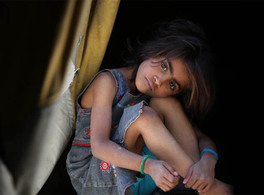Conferences and debates
Index / Activities / Conferences and debates / The Syrian refugee crisis: response and management by neighboring countries
The Syrian refugee crisis: response and management by neighboring countries
November 18, 20157:00 p.m.
MADRID
Casa Árabe Auditorium (at Calle Alcalá, 62).
7:00 p.m.
Free entry until the event’s capacity is reached.
In English and Spanish, with simultaneous translation
Representatives of the Turkish, Lebanese and Jordanian governments and
the Spanish International Development Cooperation Agency (AECID) are
taking part in this conference.
This round table discussion, titled “The Regional Dimension of the Refugee Crisis in Syria (II): Response and management by neighboring countries,” is the second in a series of two encounters organized by Casa Árabe to discuss this matter. At the first, which took place on November 3, the refugee crisis was analyzed from a regional perspective, while also examining the socio-economic impact of the crisis and humanitarian aid. The goal of this new gathering is to analyze the way in which neighboring countries are dealing with this situation and the measures which they are implementing to find a solution.
Participating in the event will be Omer Onhon, the Ambassador of Turkey in Spain; Hala Helou, an advisor to the Lebanese Minister of Social Affairs on humanitarian topics and international relations; Nayef Faraj, an advisor to the Embassy of Jordan in Spain, and Rafael de Prado, head of the Office of Humanitarian Action, attending as a substitute for the AECID. The event will be moderated by Miguel Ángel de Frutos, an ambassador and international advisor for Casa Árabe.
At the beginning of the round table discussion, an excerpt of the film “Hany’s Story” will be shown. It was produced and directed by Zahra Mackaoui, in a co-production between the UNHCR and Channel 4 (plot summary below).
Although the refugee crisis in Syria has recently appeared in the media and reached Europe’s public opinion due to the tragic images and, in many cases, mortal victims produced when refugees have attempt to cross European borders, Syria’s neighboring countries have been living through this reality for more than four years, ever since the conflict began. The situation is now reaching catastrophic dimensions, above all due to the rise in violence in certain parts of Syria and the arrival of winter.
The situation’s severity is made even more apparent if we bear in mind that, according to the latest figures offered by the United Nations High Commissioner for Refugees (UNHCR), 4,180,631 refugees in all have been displaced from Syria to its neighboring countries since the conflict began, of which 38.3%, or in other words more than one and a half million, are under the age of 11. The arrival of refugees has accelerated since 2013. At present, Turkey is home to 2,072,290 registered Syrian refugees, whereas Lebanon, a small country that had a population of just 4.4 million inhabitants when the war broke out, is now the second refugee recipient, with 1,078,338 at present. Jordan has taken in 629,627 people, as well. To this one must add that long-term refugees from other countries had already settled in Syria in recent years, including Palestinian and Iraqi refugees, who have been caught up in the conflict and displaced yet again to other neighboring countries.
Participating in the event will be Omer Onhon, the Ambassador of Turkey in Spain; Hala Helou, an advisor to the Lebanese Minister of Social Affairs on humanitarian topics and international relations; Nayef Faraj, an advisor to the Embassy of Jordan in Spain, and Rafael de Prado, head of the Office of Humanitarian Action, attending as a substitute for the AECID. The event will be moderated by Miguel Ángel de Frutos, an ambassador and international advisor for Casa Árabe.
At the beginning of the round table discussion, an excerpt of the film “Hany’s Story” will be shown. It was produced and directed by Zahra Mackaoui, in a co-production between the UNHCR and Channel 4 (plot summary below).
Although the refugee crisis in Syria has recently appeared in the media and reached Europe’s public opinion due to the tragic images and, in many cases, mortal victims produced when refugees have attempt to cross European borders, Syria’s neighboring countries have been living through this reality for more than four years, ever since the conflict began. The situation is now reaching catastrophic dimensions, above all due to the rise in violence in certain parts of Syria and the arrival of winter.
The situation’s severity is made even more apparent if we bear in mind that, according to the latest figures offered by the United Nations High Commissioner for Refugees (UNHCR), 4,180,631 refugees in all have been displaced from Syria to its neighboring countries since the conflict began, of which 38.3%, or in other words more than one and a half million, are under the age of 11. The arrival of refugees has accelerated since 2013. At present, Turkey is home to 2,072,290 registered Syrian refugees, whereas Lebanon, a small country that had a population of just 4.4 million inhabitants when the war broke out, is now the second refugee recipient, with 1,078,338 at present. Jordan has taken in 629,627 people, as well. To this one must add that long-term refugees from other countries had already settled in Syria in recent years, including Palestinian and Iraqi refugees, who have been caught up in the conflict and displaced yet again to other neighboring countries.
Omer Onhon
Ambassador of Turkey in Spain. He has held diplomatic positions in Saudi Arabia, NATO, Syria and the United States. In the Turkish Ministry of Foreign Affairs, he has worked on different occasions in the Department of the Middle East and Africa, and even become the department head. He has served as Ambassador in Syria and, before he arrived in Madrid in September of 2014, was the Ambassador/Undersecretary of Middle East and Asia-Pacific Affairs at Turkey’s Ministry of Foreign Affairs.
Hala Helou
Ms. Helou has held positions with major responsibility in Lebanon’s Ministry of Social Affairs in the fields of crisis management and volunteering programs. She has collaborated with international institutions on consultation, in work groups and at conferences on different subjects. In the academic realm, she has performed various activities with the Lebanese-American University of Byblos. At present, she is an advisor to the Minister of Social Affairs on humanitarian topics and international relations.
Rafael de Prado
With a bachelor’s degree in Law from the Universidad Complutense de Madrid and a Master’s degree in Humanitarian Aid from the Universidad Pontificia de Comillas, at the professional level Rafael de Prado has spent his career in the field of humanitarian action, working at UNHCR Mauritania, as well as being the desk officer for West Africa and the Sahel region at ACF Spain. From 2004 to 2007, he worked in the Food and Emergency Aid Area at Spain’s AECID. Since late 2012, he has held the position of Emergency Department Manager at the AECID’s Humanitarian Action Office. He currently holds the position of Humanitarian Action Director, in the status of a substitute.
Ambassador of Turkey in Spain. He has held diplomatic positions in Saudi Arabia, NATO, Syria and the United States. In the Turkish Ministry of Foreign Affairs, he has worked on different occasions in the Department of the Middle East and Africa, and even become the department head. He has served as Ambassador in Syria and, before he arrived in Madrid in September of 2014, was the Ambassador/Undersecretary of Middle East and Asia-Pacific Affairs at Turkey’s Ministry of Foreign Affairs.
Hala Helou
Ms. Helou has held positions with major responsibility in Lebanon’s Ministry of Social Affairs in the fields of crisis management and volunteering programs. She has collaborated with international institutions on consultation, in work groups and at conferences on different subjects. In the academic realm, she has performed various activities with the Lebanese-American University of Byblos. At present, she is an advisor to the Minister of Social Affairs on humanitarian topics and international relations.
Rafael de Prado
With a bachelor’s degree in Law from the Universidad Complutense de Madrid and a Master’s degree in Humanitarian Aid from the Universidad Pontificia de Comillas, at the professional level Rafael de Prado has spent his career in the field of humanitarian action, working at UNHCR Mauritania, as well as being the desk officer for West Africa and the Sahel region at ACF Spain. From 2004 to 2007, he worked in the Food and Emergency Aid Area at Spain’s AECID. Since late 2012, he has held the position of Emergency Department Manager at the AECID’s Humanitarian Action Office. He currently holds the position of Humanitarian Action Director, in the status of a substitute.
Hany Al Moliya is a young, 21-year-old Syrian man who always had big plans for his future. In Syria, he learned English by reading poetry and had signed up to study telecommunications engineering at the University of Homs. Hany achieved all of this despite suffering from a debilitating eye condition known as nystagmus, characterized by instability in his irises. This means that anything beyond his arms’ reach is out of focus. Hany is legally blind.
When the war in Syria reached his city, Homs, his cousins were murdered, and their home destroyed. Hany and his family fled to the neighboring country of Lebanon. One night, their lives changed forever, as they became one of the millions of Syrian families with no home and no future.
However, instead of giving into the harsh reality of life as a refugee, Hany began to take photos. He decided the world should see the reality inside the camps from the perspective of a refugee there. His camera helped Hany view the world more clearly, showing him everything his disease kept him from seeing. And Hany discovered he had talent.
After three years at the camps, knowing that his family’s situation will never improve and that he will never receive medical care for his condition, Hany requests asylum in Canada and gets accepted. Hany’s Story is a five-episode portrait of an exceptional youth, documenting his journey from the camps in Lebanon to Canada. It is a story of courage and endurance, with the backdrop of the war in Syria and the road of exile walked by four million refugees.
“Hany’s Story” is a co-production by the UNHCR and Channel 4, produced and directed by Zahra Mackaoui. Link to the series (20 minutes).
When the war in Syria reached his city, Homs, his cousins were murdered, and their home destroyed. Hany and his family fled to the neighboring country of Lebanon. One night, their lives changed forever, as they became one of the millions of Syrian families with no home and no future.
However, instead of giving into the harsh reality of life as a refugee, Hany began to take photos. He decided the world should see the reality inside the camps from the perspective of a refugee there. His camera helped Hany view the world more clearly, showing him everything his disease kept him from seeing. And Hany discovered he had talent.
After three years at the camps, knowing that his family’s situation will never improve and that he will never receive medical care for his condition, Hany requests asylum in Canada and gets accepted. Hany’s Story is a five-episode portrait of an exceptional youth, documenting his journey from the camps in Lebanon to Canada. It is a story of courage and endurance, with the backdrop of the war in Syria and the road of exile walked by four million refugees.
“Hany’s Story” is a co-production by the UNHCR and Channel 4, produced and directed by Zahra Mackaoui. Link to the series (20 minutes).


